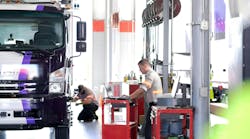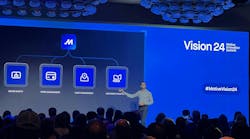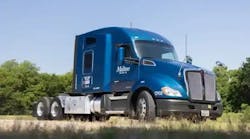Smart deployment of technology is enabling small fleets to provide big service.
For fleets that have at least 25 to 50 trucks, the business issues are essentially the same as they are for large fleets. Smaller fleets may just have fewer resources to deal with them," observes Mark Woodka, vice president of TMW Systems Inc. "In fact, they may even have to compete with much larger fleets."
If this David-and-Goliath scenario makes your small fleet knees go weak, take heart. Technology is rapidly making it possible for even very small operations to offer many of the same services as their much-larger counterparts, and at manageable costs besides. The trick is to put some big thinking behind your deployment of technology. Today's giant successes are the fleets with the best ideas and the best execution, and they're not necessarily just the big guys anymore.
Expedited carrier Express-1 Inc. of Buchanan, Mich., is a TMW customer and a good case in point. The fleet has grown from 2 trucks to 100 since its 1989 start, with a corresponding 40% average annual revenue growth that fleets of any size would admire, according to company president, Mike Welch.
"Today, we can go in and seriously compete anyplace," he says. "We have satellite tracking integrated with our automated dispatch system, as well as various Internet-based capabilities. Technology is something we've never been afraid to use if it will help us improve service or do a better job for our customers.
"We don't do things the old way or the new way; we try to do them the best way," Welch adds. "In the 1980s, you could still start a trucking company with two trucks, a cargo van and a telephone, but it's almost impossible to do that now. Shippers today expect a host of technology-enabled services that did not even exist when we started Express-1.
"Take mobile communications and vehicle tracking, for example," he continues. "Two or three years ago, we began noticing that more and more shippers were asking, 'Do you have satellite?' and when we said 'no,' it was a mark against us. To be a top-flight expediter we needed satellite, period. Service, not cost, had become the issue. Now we have the American Mobile satellite/radio system and our mobile communications capabilities are a selling tool."
Shippers and their customers Service, not cost, is increasingly the issue for shippers. And paying close attention to their evolving needs and expectations may be the most important thing a small fleet can do to help uncover opportunities to gain a competitive advantage. This is not, however, as easy as it sounds.
"In order to differentiate themselves as non-commodity service providers, transportation companies have to ask pointed questions to leading-edge customers with regard to transportation services and the transportation information," explains Gary Cross, vp-travel and transportation industry for the IBM Consulting Group, in a white paper written with Anthony Palella and Kevin Stang, also of IBM ("What Does e-business Mean to the Transportation Business?" March 1998).
"The probing questions should not be limited to just current or direct customers. Prospective customers, indirect sales channels (intermodal marketing companies, third-party logistics, and brokers), and trading partners of customers can all provide valuable insights," they continue. "Insights about the delivery processes or about the needs of stakeholders allow transportation service providers to discover superior ways of creating value."
Five questions Exactly what kinds of pointed questions might a smaller fleet ask? For starters, it makes sense to begin by learning more about your customer's business and about their customers. By becoming a student of the shipper's business, you may discover new opportunities to add value at multiple points within their operation, not just at the loading dock. Here are a few sample customer queries to help get the process started:
1. What do you consider to be your major constraints? The obstacles that are interfering with achieving higher levels of success?
2. What order-related information do you supply to your customers? How?
3. What services are most important to your customers now? Are there emerging needs or expectations that may change their perceptions? How might those changes affect your business?
4. Are there services your competitors provide that you do not?
5. How do you receive parts, components, raw materials, etc., from your own suppliers? What transportation information do they provide to you? How do you use that information?
Answers to questions such as these may help you create new revenue streams from your existing customer base. For instance, it may make sense to actually handle a customer's incoming orders for them, or to offer their customers access to your load-tracking information, or to partner with their suppliers.
This questioning and analyzing process is also worthwhile for private fleets. Typically viewed as an overhead expense rather than a core capability, and often isolated from the other business units which are their customers, it is critical for private fleets to identify as many uses as possible for transportation technologies - especially since every dollar spent on transportation might show a more direct payback if invested elsewhere (on manufacturing or marketing, for example).
Why and how "Private fleets need to think about all the good reasons why their company operates a fleet and then ask how technology can contribute," advises Dudley Fetzer, director of marketing for QUALCOMM Wireless Business Solutions. "Then they should ask, 'What other things can we do for the company with our transportation technology?' For example, could you capitalize on backhaul opportunities? Could other functions use your transportation information in some way?
"It is much tougher to identify opportunities if you can't see the whole organization and its processes," Fetzer adds. "So the burden is on private fleet managers to think like general managers and study the big picture, the entire enterprise."
For small private fleets, the incentives to think big may differ from those of for-hire carriers, but they are certainly as compelling. And sometimes, no matter how creatively a private fleet leverages its capabilities, other company issues must finally determine the fleet's future. "We are in the final stages of outsourcing our freight transportation function," says Milo Luppen, director of logistics for 130-year-old Fleischmann's Yeast, now a unit of Burns-Philp of Australia.
"Our private fleet was up to about 30 trucks, but we needed certain technology-based functions, such as vehicle tracking and mobile communications, to continue to meet our customers' needs," Luppen explains. "It was determined that the capital required to upgrade the fleet would be better utilized in our manufacturing facilities."
Economies of scale Capital investments are subject to scrutiny everywhere, of course, but the cost of technology may be of particular concern to smaller fleets. "There are economies of scale for the big fleets that simply don't exist for smaller operations," notes Dudley Fetzer. "At any size, however, fleets can get the customer service benefits from technology, even if they don't have a huge fleet. Over 60% of our own customers, for instance, have less than 100 trucks."
Diversified Transfer & Storage in Billings, Mont., for example, has 40 trucks in over-the-road contract and common carriage, 8 trucks providing local pickup and delivery, plus a brokerage company, freight-forwarding service, and 30,000-sq.-ft.warehouse, according to Mack Roof, manager of information systems.
"Food service is our specialty," Roof explains. "We implemented Tom McLeod's LoadMaster with the LTL module as a standalone system about two and a half years ago. Last March, we integrated it with our mobile communications system. There have been lots of benefits for us and for our customers. Not only are we able to provide better service to our customers and more fully utilize our equipment, we're also making better use of our employees.
"For instance, now that dispatchers don't have to be on the telephone with drivers all day, they are spending more time on higher-level projects, such as planning manifests and looking for new business opportunities," Roof says. "It has enabled us to be more proactive, to grow our business. Now we'd like to have more Internet communication with our customers, and we'd like to integrate Internet-based functions with brokerage and freight forwarding applications."
The Internet is also the key technology in Mike Welch's customer service plans. "The Internet is very, very important to us," he notes. "We already get some of our loads online. Our real goal, however, is to have Express-1 customers use the Internet, not only to schedule and track their loads, but even to look at where we have empty trucks they can utilize, perhaps at reduced rates for backhaul miles. We also want to e-mail our newsletter and information about new services or specials."
"Transportation companies that provide key shipper segments with the information they need to solve their supply chain problems can differentiate themselves from competitors who merely provide transportation of goods along with transportation information," observes Gary Cross and his colleagues in their white paper on e-business. "E-business enabled information exchange is key because it represents a way for transportation companies to create sizeable value to the shippers with only a marginal increase in costs."
"We want to become a leader for our size, and the Internet is helping us to do it," offers Mike Welch. "We may be a smaller fleet, but good ideas are not size-dependent," he adds. "And technology is enabling us to deliver a level of service that is really only limited by our thinking, our ability to find or create new opportunities."


